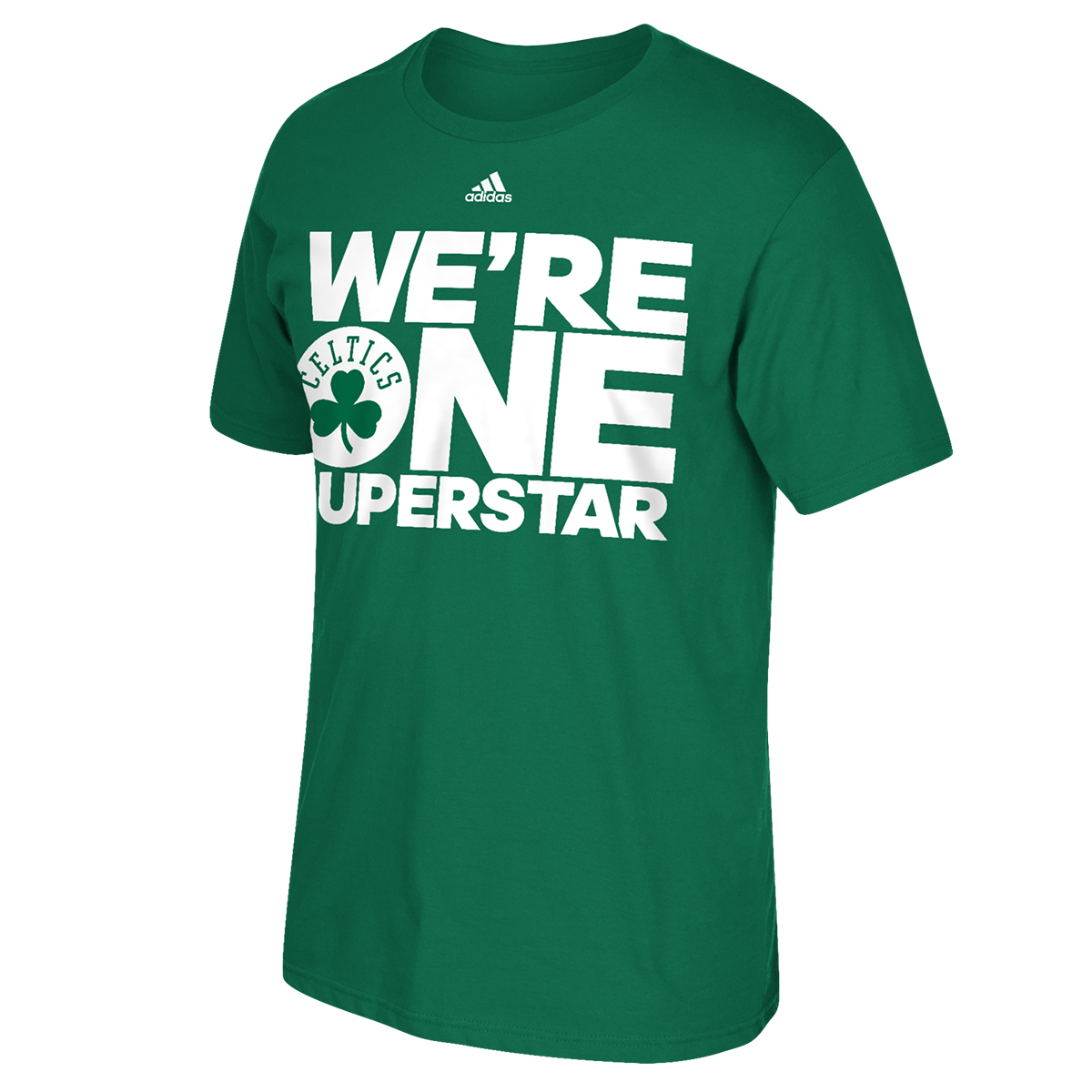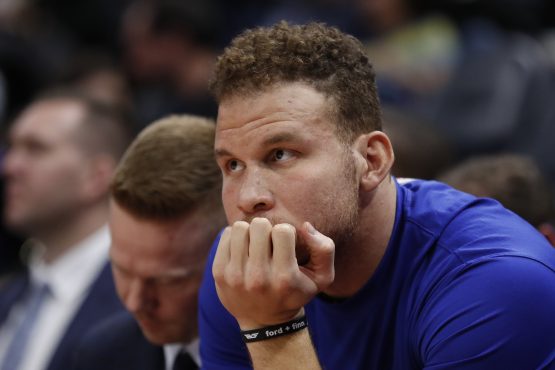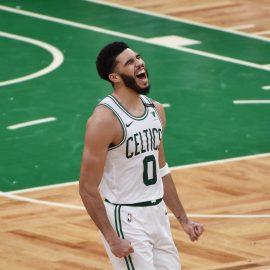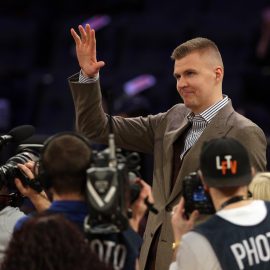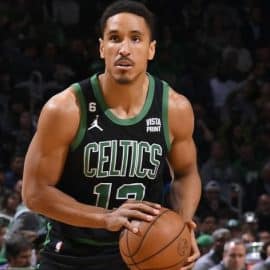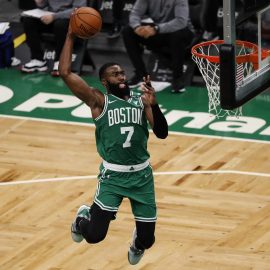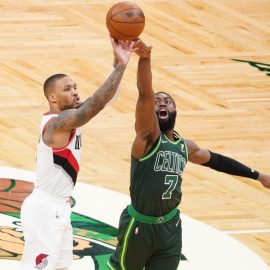Every morning, we compile the links of the day and dump them here… highlighting the big story line. Because there’s nothing quite as satisfying as a good morning dump.
“When we move the ball, we’re a really hard team to defend,” Horford said recently. “We’re a really hard team to beat.”
Except that occasionally they get away from that. They try to make plays instead of just playing. It can be that way on defense, too, with Celts getting lost in the scheme and leaving lanes open.
On Wednesday in Utah, these were the kind of things that had Brad Stevens at one point shouting, “Wake up. Wake up.”
But the beauty of this from a Celtic point of view is that these “things” are easily correctable. And you saw it on the club’s final possession against the Jazz. Shane Larkin drew the defense on a drive then sent the ball to Semi Ojeleye, who had a good look, but moved the ball to his right to Jaylen Brown for a better look. Along the way, the Celts left one of the best defenders in the league, Rudy Gobert, in a quandary, lost by the free throw line as Brown lined up the game-winning 3-pointer.
It’s utterly simple stuff, yet sometimes it escapes even the best and most veteran of teams.
The more you move the ball, the more chances you give the defense to be late on a rotation. That, in turn, gets you higher percentage shots.
I really started thinking… is it more important to have somebody named captain, or is it more important for everyone to feel ownership and feel like they own part of it.
For the most part, I want Jaylen, Jayson, Marcus Smart and Terry Rozier to all be willing to speak up, to say what they want, to feel like they’re putting their signature on things. They look up to AL, they look up to Baynes, they look up to Kyrie. They look up to those guys. At the end of the day, those guys are the ones that certainly take a large leadership role, but without necessarily disempowering someone else, which I think is really important.
So a couple years back, the Celtics tumbled into the playoffs and immediately lost Avery Bradley to a hamstring injury, we already knew that Jae Crowder was still recovering from a sprained ankle–and it later turned out that Kelly Olynyk was dealing with a bunged up shoulder.
Ah, those were the days. Those were the days when we thought that was a lot of injuries.
Anyway, the C’s had t-shirts made for the postseason with a slogan coined by Jae Crowder, “We are one superstar.”
But there’s a lot of talk about we need a superstar and stuff like that. But all five guys on the court are so locked in and so engaged that we’re one superstar. We all play together. It’s a scary thing when a team don’t know who to match up to, whose night it’s going to be on the offensive end. And, defensively, we all fight together and play together. It’s a scary approach.”
Of course, the C’s went on to add the following players:
- Al Horford
- Gordon Hayward
- Kyrie Irving
And the other night against the Jazz, none of those guys were available. Furthermore, one of the guys who were the heart and soul of that 2016 team, the guy who coined that phrase, was playing for the Jazz, not the Celtics.
Fortunately, the Celtics have been able to draft well over the past few years, so it was a pile of fresh faces that came through on Thursday, but the constant, of course, has been Stevens.
Like Mike Dynon, I’m pretty sure Stevens is not going to win COY. And frankly, that’s because (although he shouldn’t be) he’s sui generis in the NBA’s coaching fraternity. Sure, there are plenty of people who will tell you Stevens is a good coach, and they’ll make reference to the plays he draws up during time outs, his (generally) good defenses, or his small-school offense.
But COY is a popularity contest, and the winners are almost always guys that have something gaudy to hang their hat on.
Unless, with a healthy Hayward, Irving and Horford, the C’s win 70+ games next year, I don’t think Brad’s going to win COY next year either.
Because what makes Stevens a good coach is the very opposite of gaudy.
It’s his skill at keeping every player on the bench (except, memorably, David Lee) engaged. Having that ability requires the very opposite of flash, the very opposite of the kind of attention-grabbing theatrics and insistence on ‘schemes’ that make guys like D’Antoni popular candidates.
Make no mistake, Stevens has an ego, and a pretty large one. You can’t sign a contract to make millions of dollars a year telling guys who make tens of millions of dollars a year what to do on national TV without being, well, rather sure of yourself.
However, in a coaching fraternity where few of his peers recognize the negative impact of an out-of-control ego, Stevens knows when to keep his in check.
The result is a team where every player (except, memorably, David Lee) feels like they’re in a position to succeed. Any coach in the league could get the kind of performances from Shane Larkin that Stevens is getting–if they approached these players the way Stevens does.
I’ve got a book proposal about half fleshed out. It’s on the early history of Unix, one of the most important innovations in the history of computing (the device you’re reading this on either runs on a version of Unix, or has software written in the related language, C).
Anyway–and I’m going somewhere with this–Unix ended up being revolutionary because the guys that wrote it had to find creative solutions to a ton of limitations and restrictions.
Stevens learned how to coach at exactly one school. Butler. A school with a decent basketball program, but nothing spectacular–at least when he signed on as a grad assistant.
So here you are. You want to win, I mean, that’s why you’re a coach, right? You crave that winning experience.
But you can’t get top talent. Like, it’s just not going to happen. Forget about it. You can’t even cheat because your program is too small to get away with it.
There are only two ways that you can win when you’re looking at a talent and resource (and cheating) gap as big as the one between your program and, say, Kentucky’s:
- Get the best your players have to offer, from 1-15
- Get them to buy into schemes that maximize everyone’s contribution
In the survive-and-advance world of the NCAA tournament, where you only have to be better than the other team for 40 minutes, not seven games, that’s a winning strategy.
The takeaway is that Stevens became a good coach because he had to overcome the limitations of his situation.
Frankly, I think the NBA would be more fun if there were more coaches with Stevens’ background. Oddly enough, I suspect that better training for the seemingly unlimited resources and All-American talent of an NBA team comes from working with programs that have limitations and disadvantages in the NCAA scene.
So, yes, the “We are one superstar” Celtics are back, with a tip of the hat to a coach who knows that every one of his players belongs in the NBA.
Page 2/Finally: Where Kevin Durant needs to stop talking
All your blog boys and your fanboys that’s gonna use everything I say and create an article—watch a basketball game. How about you write that. I just want to say that, because all these guys are gonna write articles and get real mad about what I said tonight … they’re gonna put their emotions into it. It’s not about you. Watch a basketball game. Enjoy the game.
I’m going to combine that line from Durant–who comes across as anything but a guy who ‘enjoys the game’–with a snip from Ricky Gervais, who’s gotten into a bit of hot water himself:
See, here’s the thing. If you’re spending a lot of time telling other people to enjoy stuff–or if you feel that you have to tell people that you’re happy–it’s a pretty safe bet that you’re not enjoying yourself and you’re not particularly happy either.
Durant sees people dissecting the game and he assumes that they’re not enjoying themselves in doing so–why? Well, given his technicals, his grouchy comments, and his summer of sock-puppeting, I don’t think he’s in a very good place right now, and I think that colors his outlook on the rest of the sport.
But, to this whole question of advanced stats:
There’s a reason why the NFL became what it is (or, more or less, what it used to be)–Monday Morning Quarterbacking. The NFL has huge gaps between games, and in those gaps, fans talk. And it’s fans talking that drives consumption of broadcast/broadband, which, in turn, drives revenue.
The NBA has a regular season that is ridiculously long, with occasional gaps between games of 24 hours or less, but it generates this gigantic pile of data.
So if the preferred way for a certain group of fans to enjoy basketball is by coming up with fancy formulas that turn dozens of inputs into a single output, let ’em. Those guys subscribe to a lot of services that bring revenue into the league, they drive engagement with the league, and–ultimately–they aren’t doing any harm, unless you, as a player, pay attention to them and get all bent out of shape about what their home-cooked stat says (or doesn’t say) about you.
The guys that painstakingly break down individual plays, and write them up in blogs? These guys are giving NBA fans what they want these days.
I mean, I don’t particularly care for all this stuff myself–in no small part because of how difficult it is to quantify defense vs. how important defense is, and because of how much fun it is to just sit and watch the game–but I know how valuable this kind of stuff is to the league (and the league does as well, given the amount of data they make available on their stats site).
So, basically, KD, here’s my Public Service Announcement: Get used to it and get over it.
The rest of the links
NBC Sports: A did-that-just-happen? year | C’s youthful core keeping them afloat
Boston Globe: Do Celtics have second thoughts about top seed?
Add The Sports Daily to your Google News Feed!
